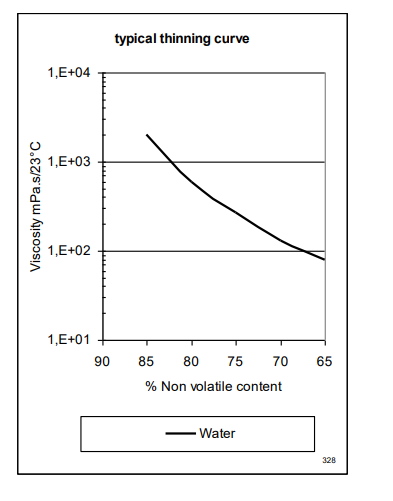Enhanced TDS
Identification & Functionality
- Blend
- No
- CASE Ingredients Functions
- Carrier
- Chemical Family
- Function
- Crosslinking Agent
- Product Code
- MITM00244
- Single Ingredient
- Yes
- Technologies
- Product Families
- Typical Thinning Curve

Features & Benefits
- CASE Ingredients Features
- Product Benefits
- Fast cure response
- Low formaldehyde release
Applications & Uses
- Coating End Applications
- Compatible Polymers & Resins
- Markets
- Applications
- Product Applications
- Can and container coatings
- Waterborne coatings
- Automotive coatings
Properties
- Physical Form
- Soluble In
- Catalysis Information
- CYMEL 328 resin may not require the addition of an acid catalyst to the formulation to obtain effective cure.
- In many instances, the acidity of the backbone polymer in the formulation is sufficient to catalyze the reaction under normal baking conditions (15 minutes at 120-150°C).
- If catalyst addition is required, then 0.5-1.0% of CYCAT® 296-9 catalyst based on total resin solids is recommended.
Technical Details & Test Data
- Technical Data
- CYMEL 328 resin contains a combination of methoxymethyl, methylol and imino functionalities making it a very effective crosslinker for backbone polymer resins containing hydroxyl, amide and carboxyl functional groups, such as alkyd, polyester or acrylic resins.
- CYMEL 328 resin is very reactive and has a tendency to self-condense at normal baking temperatures, providing films with very good hardness, flexibility, gloss, chemical resistance and outdoor durability.
- CYMEL 328 resin is very good compatible and stable with a wide range of waterborne polymer systems.
- Although the optimum level of CYMEL 328 resin should be determined experimentally, ratios of 25 to 35% based on resin solids are typically most effectiv
Packaging & Availability
- Packaging Type
Principal Information
- Group Principal Number
- S000001
- Principal
Storage & Handling
- Storage Conditions
- CYMEL 328 resin has a shelf life of 6 months from the date of manufacture when stored at temperatures between 5°C and 30°C.
- Although lower temperatures are not detrimental to stability, its viscosity will increase, possibly making the resin difficult to pump or pour.
- The viscosity will reduce again on warming, but care should be taken to avoid excessive local heat as this can cause an irreversible increase in viscosity.
- Beware of freezing
Other
- ADR/RID/ADN Proper Shipping Name
- Environmentally hazardous substance, liquid, N.O.S.
- ADR/RID/ADN UN Number
- UN3082
- Appearance
- Clear liquid
- Appearance (SDS)
- Liquid
- Color (SDS)
- Colorless
- Item Number
- Odor (SDS)
- Formaldehyde and isobutanol
- Other Hazards
- Not applicable
- Temperature Control
- No
- USA/DOT Proper Shipping Name
- Environmentally hazardous substance, liquid, N.O.S.
- USA/DOT Technical name (N.O.S.)
- Formaldehyde
- USA/DOT UN Number
- UN3082
- Chemical Properties
Value Units Test Method / Conditions Free Formaldehyde Content max. 0.5 % % Sulfite Method - Material Composition
Value Units Test Method / Conditions Non-Volatile Content 83.0-87.0 %(W/W) %(W/W) at 45°C, foil, 45 min - Optical Properties
Value Units Test Method / Conditions Color Scale max. 70.0 APHA APHA Color Scale max. 70.0 Gardner Gardner ISO 6271 - Physical Properties
Value Units Test Method / Conditions Viscosity 1000.0-3000.0 mPa.s mPa.s at 23°C - SDS Physical and Chemical Properties
Value Units Test Method / Conditions Density (SDS) 1.23 g/cm³ g/cm³ Flash Point (SDS) 94.0 °C °C SetaFlash Closed Cup Volatile Content (SDS) 12.0 %(W/W) %(W/W) - Shelf Life & Stability
Value Units Test Method / Conditions Shelf Life 6.0 mo mo
